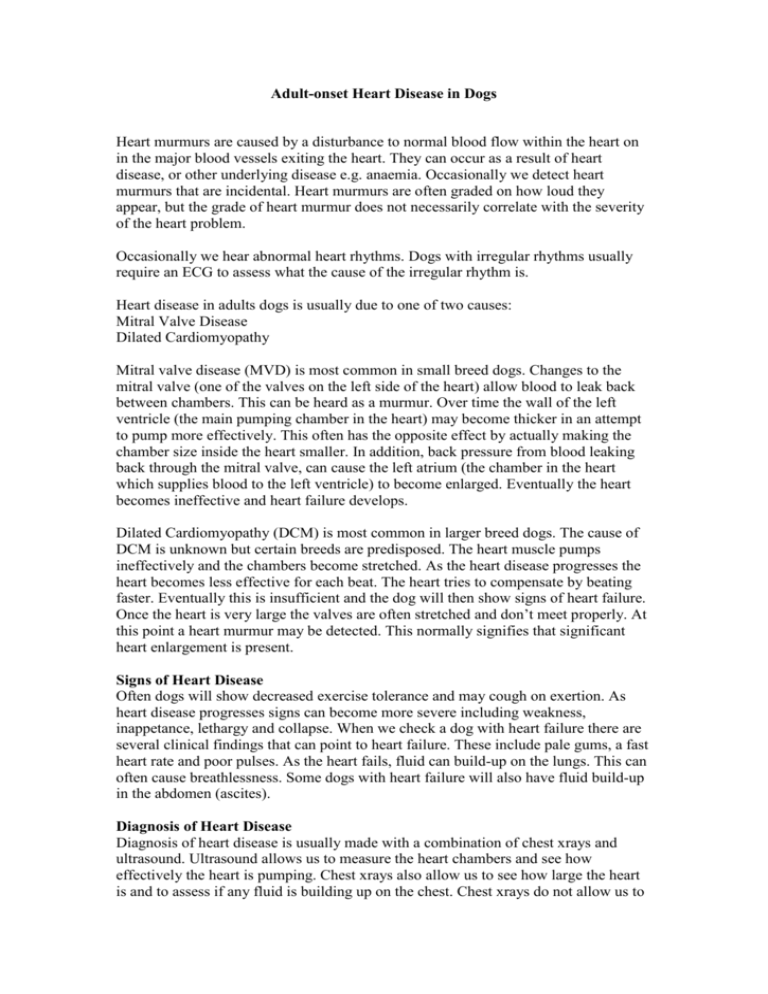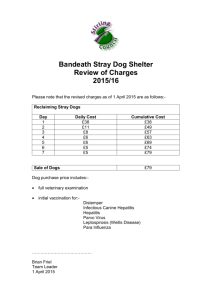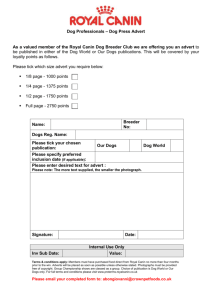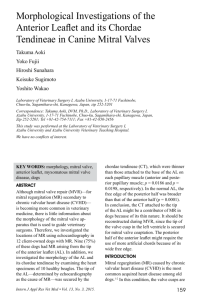Adult-onset Heart Disease in Dogs
advertisement

Adult-onset Heart Disease in Dogs Heart murmurs are caused by a disturbance to normal blood flow within the heart on in the major blood vessels exiting the heart. They can occur as a result of heart disease, or other underlying disease e.g. anaemia. Occasionally we detect heart murmurs that are incidental. Heart murmurs are often graded on how loud they appear, but the grade of heart murmur does not necessarily correlate with the severity of the heart problem. Occasionally we hear abnormal heart rhythms. Dogs with irregular rhythms usually require an ECG to assess what the cause of the irregular rhythm is. Heart disease in adults dogs is usually due to one of two causes: Mitral Valve Disease Dilated Cardiomyopathy Mitral valve disease (MVD) is most common in small breed dogs. Changes to the mitral valve (one of the valves on the left side of the heart) allow blood to leak back between chambers. This can be heard as a murmur. Over time the wall of the left ventricle (the main pumping chamber in the heart) may become thicker in an attempt to pump more effectively. This often has the opposite effect by actually making the chamber size inside the heart smaller. In addition, back pressure from blood leaking back through the mitral valve, can cause the left atrium (the chamber in the heart which supplies blood to the left ventricle) to become enlarged. Eventually the heart becomes ineffective and heart failure develops. Dilated Cardiomyopathy (DCM) is most common in larger breed dogs. The cause of DCM is unknown but certain breeds are predisposed. The heart muscle pumps ineffectively and the chambers become stretched. As the heart disease progresses the heart becomes less effective for each beat. The heart tries to compensate by beating faster. Eventually this is insufficient and the dog will then show signs of heart failure. Once the heart is very large the valves are often stretched and don’t meet properly. At this point a heart murmur may be detected. This normally signifies that significant heart enlargement is present. Signs of Heart Disease Often dogs will show decreased exercise tolerance and may cough on exertion. As heart disease progresses signs can become more severe including weakness, inappetance, lethargy and collapse. When we check a dog with heart failure there are several clinical findings that can point to heart failure. These include pale gums, a fast heart rate and poor pulses. As the heart fails, fluid can build-up on the lungs. This can often cause breathlessness. Some dogs with heart failure will also have fluid build-up in the abdomen (ascites). Diagnosis of Heart Disease Diagnosis of heart disease is usually made with a combination of chest xrays and ultrasound. Ultrasound allows us to measure the heart chambers and see how effectively the heart is pumping. Chest xrays also allow us to see how large the heart is and to assess if any fluid is building up on the chest. Chest xrays do not allow us to differentiate between different types of heart disease or to assess how well the heart is pumping. Treatment of Heart Disease Treatment of heart disease is aimed at reducing any fluid build-up on the chest and improving how well the heart is able to pump. The most commonly prescribed drugs are diuretics e.g. frusemide and spinolactone, ACE inhibitors e.g. Fortekor, Vasotop, Enacard, or a drug to sensitise the heart to calcium called Vetmedin. Costs Involved The initial consultation costs £27. Subsequent consultations cost £22.99. A dog with heart disease requiring medications will normally need to be checked every 3-6 months once stable. Cardiac ultrasounds usually cost between £55 and £77 depending on the time needed to take the measurements. Ultrasounds are normally performed whilst your dog is conscious. Follow-up ultrasounds are performed every 3-12 months depending on the severity of heart disease present. Chest xrays cost £67.21 for the first film and £36.52 for each subsequent film. Usually two xrays are needed. Most dogs require sedation for xrays to be taken. The cost of sedation varies as the amount of sedative drugs required alters considerably with the size and temperament of the dog. Drug cost vary depending on the size of your dog and which medications are required. Dogs that start on one or two drugs often require additional medications as their condition worsens. Costs for a 20kg dog will often start at around £45 per month. As the number of drugs increases the cost





